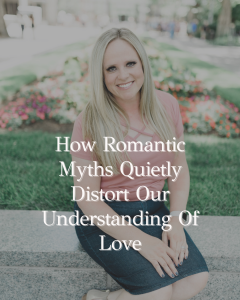
In this episode, I dive into one of the most damaging beliefs I see in relationships: the idea that sex equals love. I’ll share why this thinking creates unnecessary pain, pressure, and misunderstandings between partners, and how it often masks the many other ways love is expressed. You’ll learn how to recognize love outside of sexual intimacy, why separating sex from love can actually strengthen both, and practical shifts you can make to bring more connection, authenticity, and joy into your relationship. By the end, you’ll walk away with tools to reframe how you see love and intimacy so you can build a healthier, more fulfilling marriage. This is a great episode! I can’t wait for you to listen.
Show Summary:
Why We Think Sex Equals Love (And Why That’s a Problem)
Let’s talk about one of the most destructive equations I see in my coaching practice: Sex = Love.
You know what this sounds like, right? “If you really loved me, you’d want to have sex with me.” Or the flip side: “You turned me down for sex, so you must not love me anymore.” I hear this from clients all the time, and honestly, it breaks my heart because it’s causing so much unnecessary pain in relationships.
Just last week, I had a client – let’s call him Mark – who told me he felt completely rejected and unloved because his wife had turned down sex three times in the past two weeks. In his mind, those three “no’s” were three direct statements that she didn’t love him. Meanwhile, his wife was dealing with a sick parent, work stress, and pure exhaustion. Her love for him hadn’t changed one bit, but Mark couldn’t see that because he’d bought into this equation that sex equals love.
Where Does This Belief Come From?
So where do we get this idea? Well, it’s complicated, but there are some clear patterns.
First, let’s talk about how men are often socialized around emotions. From a young age, many boys are taught – sometimes explicitly, sometimes just through cultural osmosis – that emotions are complicated, messy, and not really their territory. But physical connection? That feels safer, more concrete. So when a man feels love, desire, appreciation, or connection, sex can become the primary way he knows how to express all of those feelings.
Think about it – we don’t typically raise our boys to have long heart-to-heart conversations about their feelings. We don’t model for them how to say “I feel so connected to you when we talk like this” or “I love you most when you’re being silly with the kids.” But we do, through movies, music, and cultural messages, teach them that sex is how you show and receive love.
I had another client, David, who grew up in a home where his parents rarely showed physical affection – no hugs, no kisses, very little touching. The only context he ever learned to associate physical connection with love was through romantic relationships and sex. So when his wife wasn’t interested in sex, his brain literally couldn’t compute other ways she might be showing love.
Then there’s the biological piece. Men often experience “connection through arousal.” When they’re sexually aroused or engaged, they feel incredibly connected to their partner. It’s like their brain chemistry creates this beautiful cocktail of bonding hormones. So they start to think, “This is when I feel most loved and connected, so this must be how love works.”
But here’s what’s fascinating – and this is where women sometimes get confused – just because that’s when men feel most connected doesn’t mean that’s the only time they’re capable of love or connection. It’s just their most familiar pathway.
We also can’t ignore how our culture portrays love and sex. Think about every romantic movie you’ve ever seen. How do the characters prove their love for each other? Usually through some grand gesture that leads to sex. The passionate kiss in the rain, the dramatic airport scene, the makeup sex after the big fight. We’re constantly fed this message that sexual desire and romantic love are the same thing.
And let’s be honest – for people in committed relationships, especially marriages, sex is often the one form of physical intimacy that’s exclusive to that relationship. You might hug your friends, hold hands with your kids, even cuddle with family members. But sex? That’s supposedly reserved for your partner. So it starts to feel like the ultimate expression of exclusive love.
Why This Equation Is So Problematic
Now, here’s why this sex-equals-love thinking is so destructive to relationships.
First, it creates enormous pressure. When your partner believes that sex is proof of love, every sexual interaction becomes loaded with way more meaning than it needs to carry. Suddenly, you’re not just saying yes or no to sex – you’re saying yes or no to love itself, at least in their mind.
I worked with a couple where the wife, Sarah, told me she felt like she was constantly being tested. Every time her husband initiated sex, she felt like he was asking, “Do you love me?” rather than “Do you want to be intimate?” That’s a crushing amount of pressure to put on what should be a joyful, connecting experience.
Second, it completely ignores the complexity of human sexuality and desire. People’s desire for sex fluctuates based on stress, health, hormones, sleep, life circumstances, and about a million other factors. But love? Love can be steady even when desire isn’t.
Think about this example: You love chocolate cake, right? But some days you want chocolate cake and some days you don’t. Some days you’re too full, too tired, or you want something else. Your feelings about chocolate cake haven’t changed, but your desire for it in that moment has. The same thing happens with sex.
I remember working with a woman who said, “I wish my husband understood that when I say no to sex, I’m not saying no to him or to our love. I’m just saying no to sex right now.” But because her husband had learned to equate the two, he couldn’t hear the difference.
Third, this equation actually makes sex less enjoyable and connecting. When sex becomes a test of love rather than an expression of desire and connection, it loses its joy. It becomes performative. People start having sex to prove love rather than to experience pleasure and connection.
And here’s something that might surprise you – this pressure often backfires. When someone feels like they have to have sex to prove their love, it can actually decrease their natural desire. It’s like being told you have to be hungry for dinner at exactly 6 PM every day, whether you feel like eating or not.
Here’s another way this gets reinforced that really bothers me: the misuse of love languages. I can’t tell you how many men I’ve worked with who say, “My love language is physical touch, so you need to have sex with me to show me love.” But that’s not what physical touch even means! Physical touch is about hand-holding, shoulder rubs, hugs, sitting close on the couch – not necessarily sex.
When we use love languages this way, we’re actually weaponizing them. Instead of saying “Help me recognize how you already show me love,” we’re saying “You need to show me love the way I want it.” I had a client, Mike, who insisted his wife didn’t love him because she wasn’t physically affectionate enough. Meanwhile, she was packing his lunch every day, managing his schedule, and making sure his favorite snacks were always in the house. She was showing love constantly – he just couldn’t see it because he was so fixated on physical touch equaling love.
The love language framework was supposed to help us notice and appreciate how our partners naturally express love. Instead, too many people use it as a demand: “You have to love me this way or it doesn’t count.” That’s not love – that’s control.
What We Need to Reframe
So what do we do instead? How do we separate sex from love in healthy ways?
First, we need to expand our definition of how love is expressed and received. The truth is, people show and feel love in dozens of different ways. Maybe your partner shows love by doing the dishes, planning date nights, or giving you their full attention during conversations. If we only recognize love through sex, we miss about 90% of the love that’s actually flowing in our relationships.
I worked with a couple where the husband, Tom, started keeping a “love journal” for a week. Every time his wife showed him love in any way – a smile, making his favorite dinner, asking about his day, touching his arm while they talked – he wrote it down. By the end of the week, he had three pages of examples. He was amazed because he’d been so focused on whether or not they were having sex that he’d missed all of these other expressions of love.
But here’s an even bigger shift I want you to consider: What if we stopped focusing so much on whether we’re being loved and started focusing on how we’re loving?
I know that sounds simple, but it’s actually revolutionary. Most of us spend way too much mental energy analyzing whether our partner loves us enough, loves us the right way, loves us as much as we love them. We’re constantly measuring and evaluating. But what if we flipped that script?
What if, instead of thinking “Does my partner love me?” we started thinking “How am I showing love to my partner today?” Instead of “Why won’t she have sex with me?” we asked “What would make her feel most loved and cared for right now?”
I had a client, Jason, who was constantly keeping score – counting how often they had sex, whether his wife initiated, how enthusiastic she was. He was miserable because he was always measuring whether he was getting enough love. Then we shifted his focus to how he could love her better. He started noticing when she seemed stressed and offering to help. He started planning little surprises. He started really listening when she talked about her day.
And you know what happened? The pressure came off their sexual relationship because it wasn’t carrying the weight of proving love anymore. Sex became about connection and desire, not about keeping score. And ironically, when he stopped demanding proof of love and started giving it freely, their whole relationship improved – including their sexual connection.
Second, we need to understand that sexual desire and love operate on different systems in our brains and bodies. Love is relatively stable. It’s that deep commitment, care, and connection you feel for your partner. Sexual desire is more variable. It’s influenced by energy levels, stress, health, novelness, and timing.
Think of it this way: Love is like the foundation of your house – it’s steady, reliable, and always there. Sexual desire is more like the weather – some days are sunny and warm, some days are cloudy, some days are stormy. The weather doesn’t change the foundation of your house.
I tell my clients to start thinking about sex as one way to express and experience love, but not the only way, and definitely not the measuring stick for love. It’s like saying that cooking together is one way to show love – but if your partner doesn’t want to cook on Tuesday night, that doesn’t mean they don’t love you.
Third, we need to create space for authentic desire. When we remove the pressure that sex equals love, we actually create more room for genuine sexual desire to flourish. People can say yes to sex because they want to connect physically, not because they feel obligated to prove their love.
I worked with a woman who told me, “Once my husband stopped making sex about whether I loved him and started making it about whether we wanted to connect and have fun together, I actually started wanting sex more often. The pressure was gone, so my natural desire had room to breathe.”
Here’s what this looks like practically: Instead of “If you loved me, you’d want sex,” try “I’d love to connect with you physically, but I understand if you’re not in the mood.” Instead of taking a “no” as rejection of your worth, try hearing it as information about what your partner desires in that moment.
And here’s a game-changer: Start having conversations about love and connection outside of sexual contexts. Ask your partner, “How do you feel most loved by me?” and actually listen to their answer. You might be surprised that it has nothing to do with sex.
I remember one client whose wife told him she felt most loved when he put away his phone during dinner and asked her about her day. He said it was like a light bulb went off – he’d been trying to show love through sexual initiation, but what she needed was his attention and presence.
The beautiful thing is, when we separate sex from love, both can actually improve. Love gets to be expressed in all its diverse, creative ways. And sex gets to be about desire, pleasure, fun, and physical connection without carrying the enormous weight of proving love.



